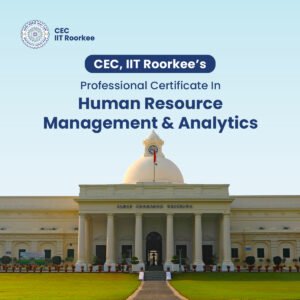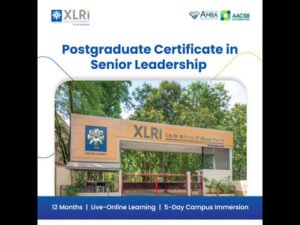The world of business is a thrilling rollercoaster. New technologies emerge, markets shift, and consumer demands evolve faster than ever. If you’re looking to navigate this dynamic landscape, your trusty old textbooks might not be enough. So, how do you equip yourself with the skills and knowledge to thrive in the management and finance world of the next decade?
Despite the economic downturn, the pandemic’s effects, the Ukraine-Russia war, financial crises in many countries, and rising interest rates, businesses have found unexpected opportunities. Many startups, small-to-medium enterprises, and corporations have grown significantly during this time.
Technology-driven startups, in particular, have been key to economic recovery, staying profitable even in tough conditions. The recent changes in the business world have also sparked lasting trends in management education.
How is online learning changing management training?
For business schools offering PGDM and MBA courses to stay relevant, their education must reflect the real-world business environment and meet the needs of both the corporate world and society. The significant changes brought about by global events and technological disruptions mean that management education needs to be reevaluated and updated for the future.
Online learning is transforming the way people are trained in management.
- Flexibility: Online courses allow learners to learn at their own pace and on their schedule. This is great for busy professionals who want to balance work, life, and education.
- Accessibility: With online learning, students from anywhere in the world can access top-quality management courses. This means you can learn from the best instructors and programs without having to relocate.
- Cost-Effective: Online courses are often more inexpensive than traditional in-person classes. You save money on tuition, travel, and accommodation.
- Variety of Courses: There’s a wide range of online management courses available, covering various topics from leadership to financial management.
Emerging Trends and Needs in Management Education
Here’s a sneak peek into the Business education trends that will revolutionize how we learn:
Trend #1: Learning by Doing – From Theory to Action Station!
Remember that overwhelming feeling of cramming for a finance exam, only to forget half of it the next day? Yeah, those days are numbered. The future is all about experiential learning. Think of it as a choose-your-own-adventure for business education. Imagine running virtual companies, participating in business simulations, and tackling real-world case studies with industry experts. This hands-on approach will allow you to not only grasp complex concepts but also develop critical thinking and problem-solving skills that employers crave.
Trend #2: Tech Takes the Wheel: AI, VR, and Your Future Boss
Get ready to ditch the dusty overhead projector – technology is revamping the classroom. Artificial intelligence (AI) is transforming into a super-powered tutor, tailoring learning experiences to your strengths and weaknesses. Are you stuck on a financial modeling problem? AI can offer personalized guidance and suggest alternative approaches. Virtual Reality (VR) will immerse you in realistic business scenarios. Imagine negotiating a high-stakes deal in a virtual boardroom or walking the factory floor of a global corporation – all from the comfort of your classroom!
Fintech usually means technology that helps people control how they manage, spend, and invest their money. One of the clearest examples of this is the use of chatbots powered by generative AI. These chatbots allow customers to interact with banking apps and online financial services using everyday language. Big financial companies like Bank of America, Wells Fargo, BlackRock, and Citigroup have already started or announced projects involving generative AI.
Trend #3: Global Citizens of Business: Sharpen Your Cross-Cultural
Borders no longer confine the business world. Companies operate across continents, and success hinges on understanding diverse cultures and perspectives. The future of management and finance education will prioritize developing your cultural intelligence. This means getting comfortable with different communication styles, navigating complex negotiations across cultures, and fostering global teamwork. Think of it as learning a new business language – the language of cultural fluency.
Trend #4: Lifelong Learning – Because the Business World Never Sleeps
The days of cramming everything you need to know for your career into four short years are over. Management and finance programs will offer flexible, bite-sized learning modules that cater to busy professionals. Think online courses, micro-credentials, and industry-specific workshops – all designed to keep your skillset sharp and relevant in an ever-changing market.
Trend #5: Developing the Soft Skills That Make You Shine
While technical expertise is crucial, the future belongs to those who can master the art of soft skills. Communication, empathy, leadership, and critical thinking will be the cornerstones of success. Management and finance programs will incorporate workshops and simulations that hone these essential skills. Imagine pitching a business idea to a panel of investors or leading a team through a complex project – all in a safe, supportive learning environment.
So, how can you prepare for this exciting future?
- Embrace the Tech: Familiarize yourself with popular business software and data analysis tools.
- Become a Global Learner: Explore online courses or international exchange programs that foster cultural understanding.
- Stay Curious: Read industry publications, attend business conferences, and network with professionals.
The future of management and finance education is all about empowering you to become a well-rounded, adaptable, and future-proof professional. So, buckle up, embrace the trends, and get ready to thrive in the thrilling world of business!
The Final Words
As we look ahead to the next decade, the future of management and finance education is bright and full of potential. The trends we’ve discussed – from digital transformation and interdisciplinary approaches to globalization and lifelong learning – are shaping a more dynamic, inclusive, and innovative educational landscape. By staying informed and adaptable, students, educators, and institutions can navigate these changes successfully and thrive in the ever-evolving world of management and finance.
Remember, the key to realization in this new era is a commitment to continuous learning and adaptability. Embrace the changes, seize the opportunities, and prepare to lead the future of management and finance with confidence and competence.
Elevate Your Financial Leadership with the CFO Course from ISB and Imarticus Learning
The CFO course from the Indian School of Business (ISB), in collaboration with Imarticus Learning, is the ideal pathway to advance your financial leadership skills. These 8-month management and finance courses will teach you to think carefully, build a high-performing team, and lead growth effectively.
The curriculum is structured to cover the latest trends in business, leadership, and strategy through various practical learning experiences, equipping CFOs with the essential skills to lead in this age of transformation.
ISB Coures is at the forefront of academic research in India, with faculty members actively engaged in policymaking with government and regulatory bodies. The industry highly seeks ISB faculty for their expertise in innovation and change management.
ISB Executive Education’s flagship CFO Programme propels learners to the pinnacle of financial leadership, attracting experts across domains, sectors, and geographies. This course allows participants to network with like-minded CXOs and industry leaders, enhancing their professional network.
As a complementary component of management and finance courses, leadership coaching provides individualized coaching solutions to assist current CXOs and aspiring CFOs in becoming powerful C-Suite professionals and facilitating their assimilation into the CFO post.
Ready to take the next step in your career?
Contact us today to learn more about the Chief Financial Officer course and how it can help you achieve your professional goals.












